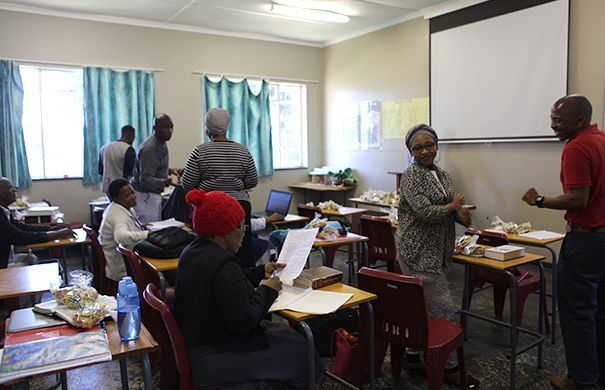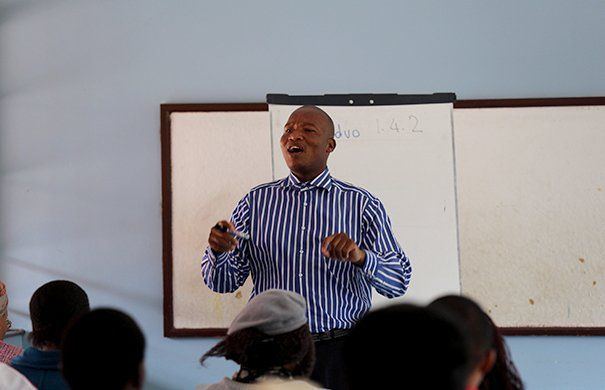“The greatest need in Africa is for good leaders,” says Eric Binion, a TEAM missionary to South Africa.
Many southern Africans claim to be Christians but if you look closer, their faith is often mixed with traditional animistic religion. Others fall into churches that preach nothing but the prosperity gospel.
As a result, spiritual deprivation and corruption run rampant.
That’s why Bible colleges and institutes in Swaziland , South Africa and Lesotho are so vital — and why prayers for their success are so important.
This month, will you pray with us for the success of healthy, true biblical teachings in southern Africa ? Pray for the Bible schools, institutions and colleges that are shining a light in a land that’s shrouded in darkness.
Sign up here to get the new Prayer Focus in your inbox each month.
1. Ask God to bring the right students to Bible school.

Pray for students at the Union Bible Institute who are learning what it looks like to share the Gospel in their communities. Photo by TEAM

Pray for students at the Union Bible Institute who are learning what it looks like to share the Gospel in their communities. Photo by TEAM
Something special happens when nationals spread the Truth among their own people. They carry a certain legitimacy that outsiders struggle to attain.
But schools can’t just take everyone. They need the right number of students to provide optimal interaction with each other and give them quality time with their teachers. Because of this, admissions staff have to be selective, and attracting quality applicants is all the more crucial.
That’s why Bible schools search for students who are teachable, humble and willing to become grace-driven — because they are ultimately the ones who will take the Truth to their friends and neighbors.
This month, ask the Lord to lead the right students to southern African Bible schools. Pray also that the school administrators will receive the perfect number of applicants to accommodate the schools’ capacities.
2. Pray for legal standing for Bible schools in southern Africa.

Bible schools similar to Durban Bible College need accreditation to best prepare future Christian leaders and missionaries. Will you pray for these schools to receive accreditation? Photo by TEAM

Bible schools similar to Durban Bible College need accreditation to best prepare future Christian leaders and missionaries. Will you pray for these schools to receive accreditation? Photo by TEAM
When it comes to Bible schools in southern Africa, academic accreditation is extremely valuable — and often difficult to obtain.
Being able to grant nationally-recognized diplomas and degrees gives both the institutions and the graduates more credible authority in the eyes of their communities. It also makes these schools more appealing to potential applicants.
In order to gain this type of standing, southern African Bible schools and institutes must often maintain good relationships with local governments and officials. This also makes it easier for the schools to obtain land, property and building permits for the purpose of expansion in the future.
Pray for accreditation and good legal standing so Bible schools can confidently grant diplomas and expand their operations as needed. Pray also that when people see graduates of these schools, they will look to them as educated community leaders.
3. Pray for faculty and staff to effectively show God’s love.

As teachers demonstrate God’s love, they teach their students how to love a world in need. Will you pray for encouragement and against burnout for these teachers? Photo by TEAM

As teachers demonstrate God’s love, they teach their students how to love a world in need. Will you pray for encouragement and against burnout for these teachers? Photo by TEAM
To produce strong, godly leaders, the faculty and staff of Bible schools have to work together and communicate well — both with each other and with their students.
As they demonstrate unity and love, faculty and staff pray that new students and visitors will sense God’s presence on campus. And they hope existing students will feel they can trust their professors’ teachings when they see their biblical principles lived out daily.
This February, pray that faculty and staff in these schools will carry themselves in an approachable, Christlike way. Pray that students will see the Lord at work in their teachers and will heed their teachings and advice.
Thank you for partnering with us in prayer! Click here to get a print-out of this month’s Prayer Focus requests and praise reports.




















